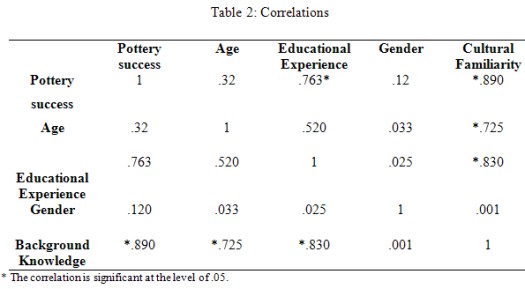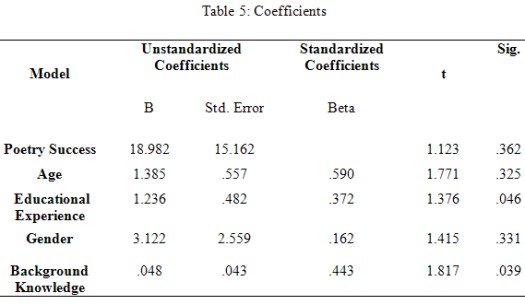Background Knowledge and Educational Experience Indices of Success in Poetry Instruction: Action Research
Ali Khodi and Sohila Faghfori, Iran
Sohila Faghfori is an Assistant Professor at Vali-e- Asr University of Rafsanjan, Iran. She received her BA from Chandigarh India 1984 and in 1986 her M.A and her PhD from Calcutta University in 2000. She has been a member of the VRU(Vali-e-Asr University of Rafsanjan) since 1979, teaching English Literature. E-mail: sohila_faghfori@yahoo.com
Ali Khodi is a PhD candidate studying applied linguistics at the University of Tehran, Kish international campus. His favorite areas of interests are language testing, discourse analysis and second language acquisition. E-mail: Alikhodi92@gmail.com
Menu
Abstract
Introduction
Literature review
Method
Results
Conclusion and discussion
References
Background knowledge has been considered as one of the most effective factors in the process of language learning. In the present study, in particular, the effect of background knowledge on the poetry instruction was investigated. To this purpose, 50 male and female seniors majoring English literature were selected and participated in poetry classes. Previously, they were provided with the required information and background knowledge. At the end of the semester, after 15 sessions of instruction, they sat for five independent tests. Consequently, the results of the statistical analysis of test scores revealed that both educational experience and background knowledge helps students in achieving their goal in poetry classes.
In the broad sense of education, mastery or non-mastery of the instructed material is the indicator of success or failure. When a word of abstract concepts tends to be written, the necessity of mastery has been accentuated. From different aspects of assessment literal concepts are considered individual perception and vary from one situation to another. Poetry classes are always tied with misunderstanding of pupils and high- level of person –dependent grasps. In line with the literature in the area of schemata theory, background knowledge and cultural familiarity are of high importance, which bridges the gaps, misconception and leads to divergent understanding. The main problem is that does this gift of the gab, reveals in instructors, provides a multidimensional atmosphere for learners to get the main idea, or the instruction process requires additional enterprises. In the present, it has been tried to investigate the effect of cultural familiarity on grasping the literal concepts of Poems.
Research questions:
- Dose cultural familiarity have any significant effect on students’ understanding of poems?
- Dose the experience of education is a good indicator of success in poetry understanding?
Literature has been suggested as a reliable source in language classes and many research studies have investigated its effectiveness in educational settings. Literature instruction improves the following qualities of presented material in the class.
- It brings authenticity into English classes by providing a multi-dimensional material for
learners whose aims are to learn language enthusiastically (Ghosn, 2002; Maley 1989;
Shrestah, 2008.)
- Steeped student in motivation stems from imagination and freshens of the content (Van, 2009).
- Promotes cultural awareness, as a necessary condition for globalization. Student perceive and
grasp what is required for making a constructive relationship with others (Tayebipour, 2009)
- Mastery in Language skills and its components by analytical explanation between lines of high quality (Erkaya, 2005, Stern, 2001).
The perfect astonishing sense of literature assisted language instruction is not bound to a limited number of pedagogical setting and sometimes the realia of instruction changes to the purpose of instruction itself. Actually in literature oriented classes, the target is the acquisition of literary texts, providing a crystal clear explanation of the literary text is more controversial than usual leading to misinterpretation and understanding by both teachers and pupils. On the special ground, poetry is one area in which numerous shortcomings and problems are sensible. Teachers and practitioners in on this issue utilized and proposed different instructional methodologies including The critical literary approach ( Malay, 1989a); The stylistic approach (Maley 1989b); Language-based Model, Literature as Content or Culture Model (Carter and Long, 1991); The Story Grammar Approach (Amer,2003), Reader Response Approach (Amer,2003); Integrated Approach (Timucin, 2001; Savvidou, 2004). Taking into account all the respective recommendations of these approaches empowers the teachers in terms of action but still the students’ perspectives toward these approaches and their usefulness are under question. The present study tries to fill the gap exists in the literature with regard to consciousness raising and utilization of background knowledge in the instruction of poetry in EFL context. To this purpose, schema theory plays an important role as the basic ground of the study defined as “every act of comprehension involves one's knowledge of the world as well" (Anderson et al. as cited in Carrell and Eisterhold 1983:73). Thus student active their own knowledge on the topic and it bring the achieved knowledge to the fore for a comprehensive understanding in better word combining textual information with the information a reader brings to a text" (Widdowson as Cited in Grabe 1988:56)
Students are most receptive to new learning when they can connect it to what they already know. Poetry provides a quick and fun way to do this.
Participants
The participant of the present study was comprised of 50 seniors majoring English literature whose age ranged from 18 to 24 years old. All the participants were familiar with the English literature they had passed the advance literary courses in university.
Instrument
The present study aimed to check the effect of the background knowledge on understanding of literary texts (i.e. poem), and the instrument was a teacher made questionnaire contained 5 open -ended questions requesting students elaborate on the information they have understand from the poems . In order to assess the level of cultural familiarity a test comprised of five open-ended questions were administered and rated by two independent teachers on a Likert scale from 1 to 5
Procedure
Firstly the required information concerning the background education was given to students in previous class and potentially they had access to this type of information. When they faced the new poems in classroom they had the capability of using pre-determined knowledge in their understanding but it not either obligatory or clearly mentioned by teacher to do be activated. During the process of the research mainly two types of activities were done in classroom setting; one with relevance to students background knowledge and the other cant not be grasped using the background knowledge. After fifteen session of instruction five independent tests were administered and two experienced teachers rate the students’ performance. It is safe to say that the level of familiarity with the respective topic was check with researchers made questionnaire along with raters’ assessment.
The table 1 represents the descriptive statistics of the variables included in the study.

Since the researcher tried to investigate the relationship between cultural familiarity and educational experience with understanding poetry a multiple regression was conducted. Table 2 provides the correlations information.

As is seen in the table Pearson correlation coefficient between the sets of variables “Cultural familiarity & age” , “Cultural familiarity & Educational Experience”, “Pottery success & Cultural Familiarity”, and “ Poetry success & Educational Experience”.
Were statistically significant (P<.05, Sig. 2 tailed).
The following table entitled “model summary” shows that how much of the dependent variable is counted by the independent variables. It could be stated that 32.2 percent of success in understanding poems is due to, and predicted by age, cultural familiarity and educational experience.

By considering the results of table 3 in interpretation leads to a confirmation in the table 4 (ANOVA) where level of significance is .178 (this is not significant in P< .05).

In spite of the fact that a high level of correlation investigated between Table 4 implies that no significant relationship exists among these predictors of the dependent variable in the research project; the further analyses is shown in table 5 named Coefficients.

Due to the fact that the correlation between Poetry success and two independent variable (i.e. Educational Experience and Cultural Familiarity) was high, he standard coefficients were analyzed, the correlation between Educational experience and Poetry success was significant (Sig=.046, P< .05). Likewise the relationship between the Cultural Familiarity and poetry success was statistically significant (Sig=.039, P< .05).
Many research studies aimed to find the relative effect to cultural familiarity and educational experience on mastery or non-mastery of literary texts; this paper in line with those previously conducted studies investigated the relationships between variables like age, educational experience and cultural familiarity on understanding poetry. On these bases it became clear that the model consists of facets including age, background familiarity and educational experience could totally explains the 32 percent of mastery in poetry courses; with regard to this, Educational Experience and Background familiarity with Beta=.372 and Beta= .443 contribution to the model were main facets and predictors of success.
Consequently, to generalize the results it could be stated those who have the higher levels of background knowledge perform better and it is a good indicator of mastery. The same pattern holds through for those who had educational experience in the field, the more they have experience the better they can grasp the content of literal texts.
Finally it is suggested to provide some familiarity for pupils in literal courses specially poetry during a long period of time which leads to a level of self-consciousness and automated understanding.
Amer, A. (2003). Teaching EFL/ESL literature. The Reading Matrix, 3 (2), 63-73.
Anderson, R.C. and Pearson, P.D. (1984) "A Schema-Theoretic View of Basic Processes in Reading Comprehension", in Carrell, P.L., Devine, J. and Eskey, D.E. (eds) (1988) Interactive Approaches to Second Language Reading. Cambridge: CUP.
Carter, R. & Long, M.N. (1991). Teaching Literature. Harlow, Essex: Longman.
Erkaya, O. R. (2005). Benefits of using short stories in the EFL Context. Asian EFL Journal, 8, 1-13.
Ghosn, I. (2002). Four good reasons to use literature in primary school ELT. ELT Journal, 56, (2), 172-179.
Grabe, W. (1988) "Reassessing the Term 'Interactive'", in Carrell, P.L., Devine, J. and Eskey, D.E. (eds) (1988) Interactive Approaches to Second Language Reading. Cambridge: CUP.
Maley, A. (1989a). Down from the pedestal: Literature as resource. In R. Carter, R. Walker & C. Brumfit (eds.), Literature and the learner: methodological approaches. (pp. 1-9). Modern English Publications and the British Counsel.
Maley, A. (1989b). A comeback for literature? Practical English Teacher, 10, 59.
Savvidou, C. (2004). An integrated approach to the teaching of literature in the EFL classroom. The Internet TESL Journal, 12.
Shrestah, P. N. (2008). Using stories with young learners. In M. Krzanowski (ed.), Current developments in English for academic, specific and occupational purposes. Garnet publishing, UK.
Stern, S. L. (2001) An Integrated Approach to Literature in ESL/EFL. In M. Celce-Murcia (ed.) Teaching English as a Second or Foreign Language. Heinle & Heinle.
Tayebipour, F. (2009). In Defence of Teaching literature to EFL students in the era of Globalization. In L.J. Zhang,R. Rubdy, & Alsagoff (Eds.), Englishes and Literatures-in-English in a Globalised World: Proceedings of the 13th International Conference on English in Southeast Asia (pp. 213-219). Singapore: National Institute of Education, Nanyang Technological University.
Timucin, M. (2001). Gaining insight into alternative teaching approaches employed in an EFL literature class Revista de Filología y su Didáctica, 24, 269-293.
Van, T.T.M. (2009). The relevance of literary analysis to teaching literature in the EFL classroom. English Teaching Forum, 3, 2-9.

Please check the English Language Improvement for Teachers course at Pilgrims website.
Please check the English Language Improvement for Adults course at Pilgrims website.
Please check the British Life, Language and Culture course at Pilgrims website.
Please check the Teaching Advanced Students course at Pilgrims website.
Please check the How to be a Teacher Trainer course at Pilgrims website.


|